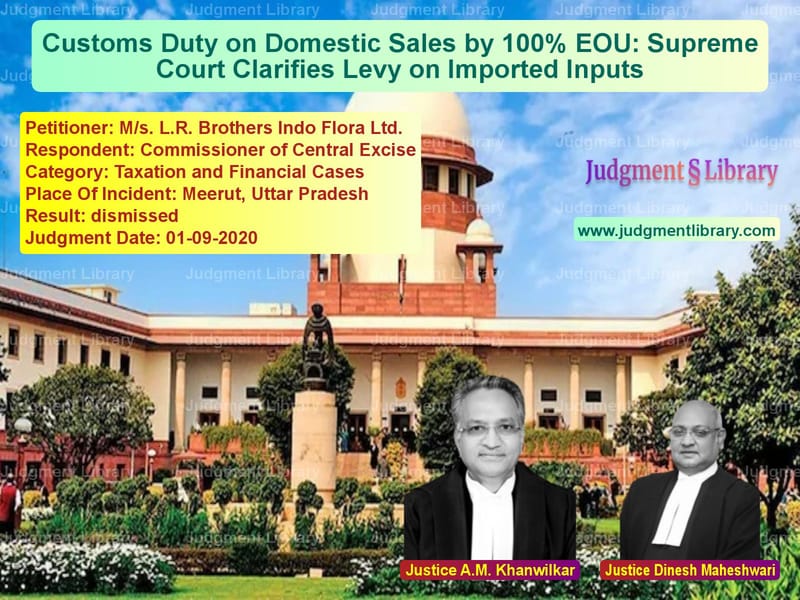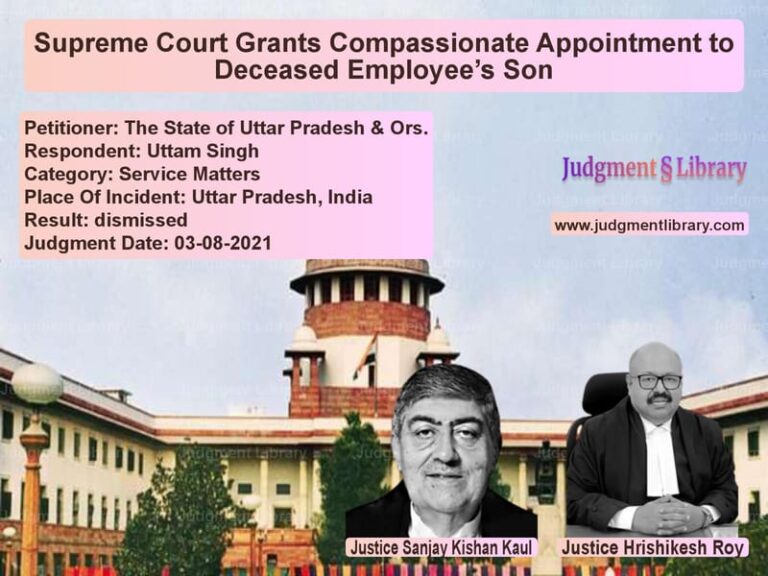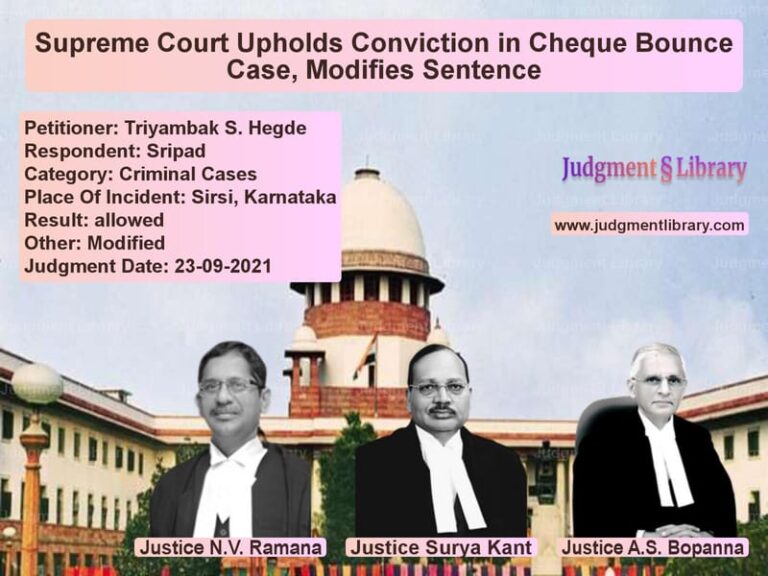Customs Duty on Domestic Sales by 100% EOU: Supreme Court Clarifies Levy on Imported Inputs
The case of M/s. L.R. Brothers Indo Flora Ltd. vs. Commissioner of Central Excise revolves around the levy of customs duty on non-excisable goods produced in India by a 100% Export-Oriented Unit (EOU) and sold in the Domestic Tariff Area (DTA). The Supreme Court was called upon to decide whether such domestic sales would attract customs duty on imported inputs used in production and whether an amendment to the relevant exemption notification should apply retrospectively.
The appellant, a floriculture unit operating as a 100% EOU, sold cut flowers in the domestic market without obtaining prior approval from the Development Commissioner and without achieving the required net foreign exchange earnings. The customs authorities imposed a duty of Rs. 9,98,177 on these sales, which was challenged before various appellate bodies before reaching the Supreme Court.
Background of the Case
The appellant, M/s. L.R. Brothers Indo Flora Ltd., operated as a 100% Export-Oriented Unit (EOU) engaged in the production of cut flowers. As an EOU, it was entitled to duty-free imports of capital goods and raw materials under the Exemption Notification No. 126/94-Cus, dated June 3, 1994, which provided relief from customs duties on inputs used for manufacturing goods meant for export.
However, the Export-Import (EXIM) Policy allowed EOUs to sell up to 50% of their products in the Domestic Tariff Area (DTA), provided they:
- Achieved a minimum net foreign exchange earning of 20%.
- Obtained prior approval from the Development Commissioner.
- Paid the applicable customs duty on imported inputs used in DTA sales.
The appellant sold flowers worth Rs. 38,40,537 in the domestic market between 1998-99 and 2000-01 without prior approval and without achieving the prescribed foreign exchange earnings. The customs department issued a demand for customs duty on the imported inputs used in producing these flowers, arguing that the appellant had violated the conditions of the exemption notification.
Petitioner’s Arguments
The appellant contended:
- The flowers sold in the domestic market were grown in India, not imported, and thus could not attract customs duty.
- Since cut flowers were non-excisable goods, no excise or customs duty should be imposed on their domestic sale.
- The exemption notification only allowed customs duty to be levied on imported inputs, not on the final product.
- The amendment made by Notification No. 56/01-Cus, dated May 18, 2001, which clarified that duty was to be charged on actual imported inputs, was clarificatory and should apply retrospectively.
- There was no deliberate suppression of facts, and thus the extended limitation period under Section 28 of the Customs Act should not apply.
Respondent’s Arguments
The customs authorities argued:
- The appellant had violated EXIM Policy conditions by selling in DTA without approval and without meeting the net foreign exchange requirement.
- Since the sales were unauthorized, the exemption notification did not apply, and duty had to be imposed as if the goods were imported.
- Even though the flowers themselves were grown in India, imported inputs such as live rose plants, fertilizers, and greenhouse equipment were used in their production.
- The amendment in 2001 was substantive, not clarificatory, and could not apply retrospectively.
- The appellant had willfully suppressed facts, justifying the extended limitation period under Section 28 of the Customs Act.
Supreme Court’s Key Observations
The Supreme Court reviewed the facts and the legal provisions and made the following key observations:
“The exemption notification required compliance with EXIM Policy conditions. Since the appellant violated these conditions, it lost the exemption benefit and became liable for customs duty.”
Further, the Court stated:
- Goods produced by a 100% EOU and sold in DTA in violation of policy conditions are deemed imported and subject to customs duty.
- Customs duty on non-excisable goods sold domestically is to be levied based on the imported inputs used in their production.
- The 2001 amendment was not clarificatory but introduced a substantive change; hence, it could not apply retrospectively.
- Since the appellant did not seek approval before making DTA sales, it was guilty of willful suppression, justifying the extended limitation period.
Final Judgment
The Supreme Court upheld the customs duty demand and ruled:
“The customs duty has been correctly charged on the imported inputs used in the production of cut flowers sold in the DTA, and the amendment to the exemption notification does not apply retrospectively.”
The Court dismissed the appeal, affirming the decisions of the lower authorities and imposing the duty along with interest and penalties.
Implications of the Judgment
This ruling has significant implications for EOUs and taxation policies:
- EOUs must strictly comply with EXIM Policy conditions to avail exemption benefits.
- Unauthorized domestic sales by EOUs will attract customs duty on imported inputs.
- Amendments to exemption notifications are not automatically retrospective unless expressly stated.
- Failure to disclose domestic sales and seek approval can lead to extended limitation periods for duty recovery.
With this judgment, the Supreme Court reaffirmed the principle that tax exemptions are subject to strict compliance with policy conditions, ensuring that EOUs operate within the prescribed legal framework.
Petitioner Name: M/s. L.R. Brothers Indo Flora Ltd..Respondent Name: Commissioner of Central Excise.Judgment By: Justice A.M. Khanwilkar, Justice Dinesh Maheshwari.Place Of Incident: Meerut, Uttar Pradesh.Judgment Date: 01-09-2020.
Don’t miss out on the full details! Download the complete judgment in PDF format below and gain valuable insights instantly!
Download Judgment: Ms. L.R. Brothers I vs Commissioner of Cent Supreme Court of India Judgment Dated 01-09-2020.pdf
Direct Downlaod Judgment: Direct downlaod this Judgment
See all petitions in Customs and Excise
See all petitions in Tax Refund Disputes
See all petitions in Income Tax Disputes
See all petitions in Judgment by A M Khanwilkar
See all petitions in Judgment by Dinesh Maheshwari
See all petitions in dismissed
See all petitions in supreme court of India judgments September 2020
See all petitions in 2020 judgments
See all posts in Taxation and Financial Cases Category
See all allowed petitions in Taxation and Financial Cases Category
See all Dismissed petitions in Taxation and Financial Cases Category
See all partially allowed petitions in Taxation and Financial Cases Category







